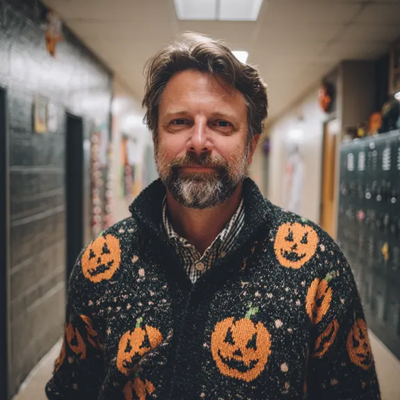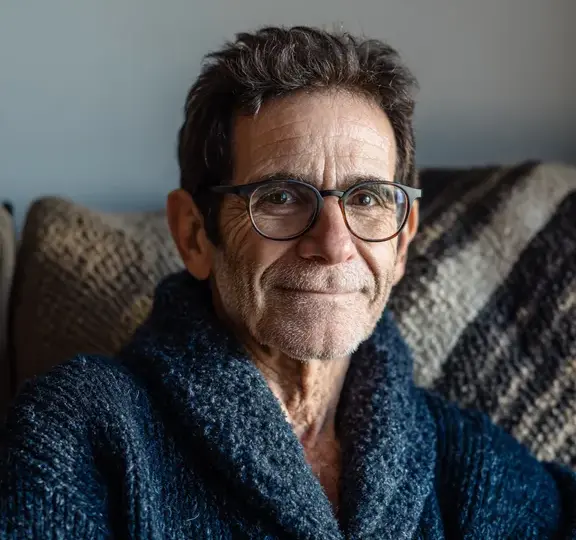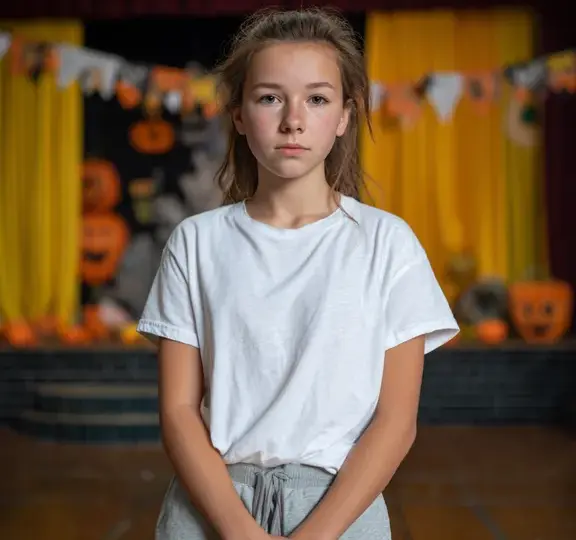
I Once Helped a Poor Girl on Halloween — I Never Knew She’d One Day Walk Down the Aisle Toward Me.
On a chaotic Halloween morning, a quiet act of kindness bound me — a tired art teacher — to a little girl who needed more than a costume. Years later, that bond would return to change both of our lives in ways neither of us could have imagined. It was Halloween morning, and the school auditorium shimmered with glitter, plastic tiaras, and superhero capes. Laughter filled the room — wild, bright, and just on the edge of chaos. I was forty-eight then — middle-aged, slightly gray at the temples, still clinging to my “cool art teacher” title for dear life. The kids were buzzing on sugar and excitement, proudly showing off their costumes and hungry for attention.
We’d turned the stage into a haunted art gallery — neon jack-o’-lanterns, glitter-glued haunted houses, and skeletons with googly eyes. I was standing on a ladder adjusting a crooked paper bat when I saw her —
Ellie. She didn’t walk into the room so much as fade into it, like a shadow slipping under a door. Her shoulders were hunched, her eyes fixed on the floor. She wore gray pants and a plain white T-shirt. Her ponytail was pulled too tight, like it had been done in a rush.
No costume. No sparkle. No joy. In a room full of color, she looked like a pencil sketch. And before the laughter even began — before the teasing words started to swirl through the air like smoke — I felt it deep in my gut:
This moment will matter. Then came the voice of a boy across the gym. “What are you supposed to be, Ugly Ellie?” he called, yanking her ponytail. Ellie flinched like she’d been struck. The laughter around her sharpened into something cruel. “Did your dad forget about you again?” another boy sneered. “Typical.”

My heart dropped. I knew about her father — his illness, the bills, the quiet way Ellie carried it all. A circle was forming, as it always does when children sense weakness. One girl crossed her arms and said coldly, “Maybe stay home next year, Ellie. Spare us — and yourself — the embarrassment.” Then someone else, crueler still, added, “Even makeup couldn’t fix that face.” The chant began before I could stop it. “Ugly Ellie! Ugly Ellie! Ugly Ellie!” I climbed down from the ladder, my hands shaking. I wanted to yell, to send them scattering — but she didn’t need more eyes on her pain. She needed
a way out. Quietly. Dignified. I slipped through the crowd and crouched beside her near the bleachers. Her hands were pressed over her ears, tears streaking her cheeks.
“Ellie,” I said softly, “sweetheart, look at me.” She peeked at me through one wet eye. “Come with me,” I said gently. “I’ve got an idea. A good one.” She hesitated, then nodded. I placed a light hand on her shoulder and led her down the hallway to the art room’s supply closet. The bulb flickered once and steadied. The air smelled of chalk and paint. I grabbed two rolls of toilet paper. “What’s that for?” she asked. “For your costume,” I said with a smile. “We’re going to make you the best one in the whole school.” “But I don’t have a costume, Mr. B,” she whispered.
“You do now,” I said, meeting her eyes. She still looked unsure, the hurt clinging to her, but there was a flicker of hope too. “Arms up,” I said. She raised them slowly, and I began wrapping the toilet paper around her — gently, carefully, layer by layer. “You know,” I said, “mummies were considered guardians in ancient Egypt — powerful and respected.” “Really?” she whispered. “Really,” I said, grinning. “So you’re not just a mummy — you’re a guardian mummy.” Her smile began to grow. I added small red marker streaks for effect and clipped a tiny plastic spider on her shoulder. “There,” I said. “Perfect.”

She turned toward the mirror and gasped. “Is that really me?” “You look incredible,” I said. “They won’t know what hit them.” She threw her arms around me and whispered, “Thank you, Mr. B.” When we walked back into the gym, the noise dropped. Kids stared. One of the boys even stepped aside. Ellie stood tall — her chin up, her eyes bright. That small act didn’t just save her Halloween. It changed something in her. And, though I didn’t realize it then, it changed something in me too.
Years of Quiet Connection
After that day, Ellie started staying after class — rinsing paintbrushes long after the others had gone, sometimes talking, sometimes silent. She’d ask questions about art that weren’t really about art. As her father’s health worsened, I saw her carrying the weight — in her tired eyes and quiet voice. When he passed away during her sophomore year, she called me first. “Mr. Borges,” she whispered through tears, “he’s gone.” At the funeral, she gripped my sleeve the entire service. I didn’t have words — just presence. At the graveside, I leaned in and whispered, “I’ll take care of her, sir. I promise.” And I meant it.
Years before, I had lost my fiancée and unborn daughter in a car accident. I had believed love — the kind that makes life feel full — was gone for good. But Ellie became the daughter I never had. When she earned a scholarship to Boston, I hugged her goodbye and told her how proud I was. Every Halloween after that, a card arrived — always a hand-drawn mummy and the same words:
“Thank you for saving me, Mr. B.”
Fifteen Years Later
I was sixty-three, retired, my days filled with crossword puzzles and lukewarm tea. Then one morning, a package arrived. Inside was a fine charcoal-gray suit — and beneath it, a wedding invitation.
“Ellie Grace H. marrying Walter John M.”
Tucked in was a handwritten note:
“Dear Mr. Borges,
Fifteen years ago, you helped a scared little girl feel brave. You’ve been my mentor, my friend, and the closest thing I’ve ever had to a father.
Would you do me the honor of walking me down the aisle?
—Ellie”
I pressed the suit to my chest and cried — not for what I’d lost, but for what I’d been given. On her wedding day, Ellie was radiant. When she reached for my arm, her fingers curled around my sleeve — just like that Halloween morning long ago. “I love you, Mr. B,” she whispered. “I love you too, kiddo,” I said. We walked down the aisle together — not as teacher and student, but as family. And in that moment, I realized something I’d never dared to admit before: I hadn’t saved her that day. She had saved me too.
Epilogue
Years later, I became “Papa B” to her two children — bright, giggling whirlwinds who filled my quiet house with crayons and noise. We drew spiders together, just like the one I’d clipped on their mother’s shoulder all those years ago. Once, my granddaughter asked, “Papa, why do you always tell the Halloween story?” “Because,” I said, “it reminds me what one small act of kindness can do — how it can change someone’s life.” “Like how you changed Mommy’s?” she asked. “And how she changed mine,” I said, smiling.
Sometimes, the moment that changes everything doesn’t come with fanfare. Sometimes it’s just a whisper, a look, a small act of care. And sometimes, that’s all it takes — a roll of toilet paper, a red marker, and a heart willing to say:
You matter.
On a chaotic Halloween morning, a quiet act of kindness bound me — a tired art teacher — to a little girl who needed more than a costume. Years later, that bond would return to change both of our lives in ways neither of us could have imagined. It was Halloween morning, and the school auditorium shimmered with glitter, plastic tiaras, and superhero capes. Laughter filled the room — wild, bright, and just on the edge of chaos. I was forty-eight then — middle-aged, slightly gray at the temples, still clinging to my “cool art teacher” title for dear life. The kids were buzzing on sugar and excitement, proudly showing off their costumes and hungry for attention.
We’d turned the stage into a haunted art gallery — neon jack-o’-lanterns, glitter-glued haunted houses, and skeletons with googly eyes. I was standing on a ladder adjusting a crooked paper bat when I saw her — Ellie. She didn’t walk into the room so much as fade into it, like a shadow slipping under a door. Her shoulders were hunched, her eyes fixed on the floor. She wore gray pants and a plain white T-shirt. Her ponytail was pulled too tight, like it had been done in a rush.
No costume. No sparkle. No joy. In a room full of color, she looked like a pencil sketch. And before the laughter even began — before the teasing words started to swirl through the air like smoke — I felt it deep in my gut: This moment will matter. Then came the voice of a boy across the gym. “What are you supposed to be, Ugly Ellie?” he called, yanking her ponytail. Ellie flinched like she’d been struck. The laughter around her sharpened into something cruel. “Did your dad forget about you again?” another boy sneered. “Typical.”

My heart dropped. I knew about her father — his illness, the bills, the quiet way Ellie carried it all. A circle was forming, as it always does when children sense weakness. One girl crossed her arms and said coldly, “Maybe stay home next year, Ellie. Spare us — and yourself — the embarrassment.” Then someone else, crueler still, added, “Even makeup couldn’t fix that face.” The chant began before I could stop it. “Ugly Ellie! Ugly Ellie! Ugly Ellie!” I climbed down from the ladder, my hands shaking. I wanted to yell, to send them scattering — but she didn’t need more eyes on her pain. She needed a way out. Quietly. Dignified. I slipped through the crowd and crouched beside her near the bleachers. Her hands were pressed over her ears, tears streaking her cheeks.
“Ellie,” I said softly, “sweetheart, look at me.” She peeked at me through one wet eye. “Come with me,” I said gently. “I’ve got an idea. A good one.” She hesitated, then nodded. I placed a light hand on her shoulder and led her down the hallway to the art room’s supply closet. The bulb flickered once and steadied. The air smelled of chalk and paint. I grabbed two rolls of toilet paper. “What’s that for?” she asked. “For your costume,” I said with a smile. “We’re going to make you the best one in the whole school.” “But I don’t have a costume, Mr. B,” she whispered.
“You do now,” I said, meeting her eyes. She still looked unsure, the hurt clinging to her, but there was a flicker of hope too. “Arms up,” I said. She raised them slowly, and I began wrapping the toilet paper around her — gently, carefully, layer by layer. “You know,” I said, “mummies were considered guardians in ancient Egypt — powerful and respected.” “Really?” she whispered. “Really,” I said, grinning. “So you’re not just a mummy — you’re a guardian mummy.” Her smile began to grow. I added small red marker streaks for effect and clipped a tiny plastic spider on her shoulder. “There,” I said. “Perfect.”

She turned toward the mirror and gasped. “Is that really me?” “You look incredible,” I said. “They won’t know what hit them.” She threw her arms around me and whispered, “Thank you, Mr. B.” When we walked back into the gym, the noise dropped. Kids stared. One of the boys even stepped aside. Ellie stood tall — her chin up, her eyes bright. That small act didn’t just save her Halloween. It changed something in her. And, though I didn’t realize it then, it changed something in me too.
Years of Quiet Connection
After that day, Ellie started staying after class — rinsing paintbrushes long after the others had gone, sometimes talking, sometimes silent. She’d ask questions about art that weren’t really about art. As her father’s health worsened, I saw her carrying the weight — in her tired eyes and quiet voice. When he passed away during her sophomore year, she called me first. “Mr. Borges,” she whispered through tears, “he’s gone.” At the funeral, she gripped my sleeve the entire service. I didn’t have words — just presence. At the graveside, I leaned in and whispered, “I’ll take care of her, sir. I promise.” And I meant it.
Years before, I had lost my fiancée and unborn daughter in a car accident. I had believed love — the kind that makes life feel full — was gone for good. But Ellie became the daughter I never had. When she earned a scholarship to Boston, I hugged her goodbye and told her how proud I was. Every Halloween after that, a card arrived — always a hand-drawn mummy and the same words:
“Thank you for saving me, Mr. B.”
Fifteen Years Later
I was sixty-three, retired, my days filled with crossword puzzles and lukewarm tea. Then one morning, a package arrived. Inside was a fine charcoal-gray suit — and beneath it, a wedding invitation.
“Ellie Grace H. marrying Walter John M.”
Tucked in was a handwritten note:
“Dear Mr. Borges,
Fifteen years ago, you helped a scared little girl feel brave. You’ve been my mentor, my friend, and the closest thing I’ve ever had to a father.
Would you do me the honor of walking me down the aisle?
—Ellie”
I pressed the suit to my chest and cried — not for what I’d lost, but for what I’d been given. On her wedding day, Ellie was radiant. When she reached for my arm, her fingers curled around my sleeve — just like that Halloween morning long ago. “I love you, Mr. B,” she whispered. “I love you too, kiddo,” I said. We walked down the aisle together — not as teacher and student, but as family. And in that moment, I realized something I’d never dared to admit before: I hadn’t saved her that day. She had saved me too.
Epilogue
Years later, I became “Papa B” to her two children — bright, giggling whirlwinds who filled my quiet house with crayons and noise. We drew spiders together, just like the one I’d clipped on their mother’s shoulder all those years ago. Once, my granddaughter asked, “Papa, why do you always tell the Halloween story?” “Because,” I said, “it reminds me what one small act of kindness can do — how it can change someone’s life.” “Like how you changed Mommy’s?” she asked. “And how she changed mine,” I said, smiling.
Sometimes, the moment that changes everything doesn’t come with fanfare. Sometimes it’s just a whisper, a look, a small act of care. And sometimes, that’s all it takes — a roll of toilet paper, a red marker, and a heart willing to say:
You matter.